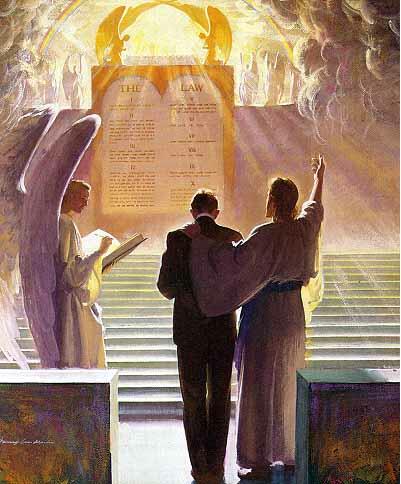
Jesus Pleads
In the great day of final award, the dead are to be "judged out of those things which were written in the books, according to their works." Revelation 20:12. Then by virtue of the atoning blood of Christ, the sins of all the truly penitent will be blotted from the books of heaven. Thus the sanctuary will be freed, or cleansed, from the record of sin. In the type, this great work of atonement, or blotting out of sins, was represented by the services of the Day of Atonement—the cleansing of the earthly sanctuary, which was accomplished by the removal, by virtue of the blood of the sin offering, of the sins by which it had been polluted.
Satan invents unnumbered schemes to occupy our minds, that they may not dwell upon the very work with which we ought to be best acquainted. The archdeceiver hates the great truths that bring to view an atoning sacrifice and an all-powerful mediator. He knows that with him everything depends on his diverting minds from Jesus and His truth.
Jesus pleads in their behalf His wounded hands, His bruised body; and He declares to all who would follow Him: "My grace is sufficient for thee." 2 Corinthians 12:9. "Take My yoke upon you, and learn of Me; for I am meek and lowly in heart: and ye shall find rest unto your souls. For My yoke is easy, and My burden is light." Matthew 11:29, 30. Let none, then, regard their defects as incurable. God will give faith and grace to overcome them.
We are now living in the great day of atonement. In the typical service, while the high priest was making the atonement for Israel, all were required to afflict their souls by repentance of sin and humiliation before the Lord, lest they be cut off from among the people. In like manner, all who would have their names retained in the book of life should now, in the few remaining days of their probation, afflict their souls before God by sorrow for sin and true repentance. There must be deep, faithful searching of heart. The light, frivolous spirit indulged by so many professed Christians must be put away. There is earnest warfare before all who would subdue the evil tendencies that strive for the mastery. The work of preparation is an individual work. We are not saved in groups. The purity and devotion of one will not offset the want of these qualities in another. Though all nations are to pass in judgment before God, yet He will examine the case of each individual with as close and searching scrutiny as if there were not another being upon the earth. Everyone must be tested and found without spot or wrinkle or any such thing.
Solemn are the scenes connected with the closing work of the atonement. Momentous are the interests involved therein. The judgment is now passing in the sanctuary above. For many years this work has been in progress. Soon—none know how soon—it will pass to the cases of the living. In the awful presence of God our lives are to come up in review. At this time above all others it behooves every soul to heed the Saviour's admonition: "Watch and pray: for ye know not when the time is." Mark 13:33.
When the work of the investigative judgment closes, the destiny of all will have been decided for life or death. Probation is ended a short time before the appearing of the Lord in the clouds of heaven. Christ in the Revelation, looking forward to that time, declares: "He that is unjust, let him be unjust still: and he which is filthy, let him be filthy still: and he that is righteous let him be righteous still: and he that is holy, let him be holy still. And, behold, I come quickly; and My reward is with Me, to give every man according as his work shall be." Revelation 22:11, 12.
The righteous and the wicked will still be living upon the earth in their mortal state—men will be planting and building, eating and drinking, all unconscious that the final, irrevocable decision has been pronounced in the sanctuary above.
Silently, unnoticed as the midnight thief, will come the decisive hour which marks the fixing of every man's destiny, the final withdrawal of mercy's offer to guilty men.
CCh 348-349